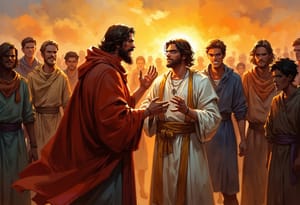| Series | Walking with Jesus: Christian Life |
|---|---|
| Theme | 2. Following the way - Mulimuli i ala |
| Season | Leni |
| Colour | Lanu Violē |
| Special Day | Fono – Komiti Au Toea’ina |
Scripture Focus: Ioane 9:1-12
As he passed by, he saw a man blind from birth. His disciples asked him, “Rabbi, who sinned, this man or his parents, that he was born blind?” Jesus answered, “Neither did this man sin, nor his parents; but, that the works of God might be revealed in him. I must work the works of him who sent me, while it is day. The night is coming, when no one can work. While I am in the world, I am the light of the world.” When he had said this, he spat on the ground, made mud with the saliva, anointed the blind man’s eyes with the mud, and said to him, “Go, wash in the pool of Siloam” (which means “Sent”). So he went away, washed, and came back seeing. The neighbors therefore, and those who saw that he was blind before, said, “Isn’t this he who sat and begged?” Others were saying, “It is he.” Still others were saying, “He looks like him.” He said, “I am he.” They therefore were asking him, “How were your eyes opened?” He answered, “A man called Jesus made mud, anointed my eyes, and said to me, ‘Go to the pool of Siloam, and wash.’ So I went away and washed, and I received sight.” Then they asked him, “Where is he?” He said, “I don’t know.”
- John 9:1-12 (WEB)
Study:
This passage presents a fascinating encounter where Jesus’s method of healing is unusual, to say the least. The disciples, bound by conventional thinking, immediately seek to assign blame – suggesting either the man or his parents must have sinned to cause this affliction. Jesus refutes this, declaring that this situation isn’t about sin, but about revealing God’s power. He asserts He must “work the works of him who sent me while it is day,” emphasizing urgency and divine purpose. The act of making mud and applying it to the man's eyes is a physical, tactile demonstration of faith and power, entirely outside the realm of expected healing practices. The instruction to go to the pool of Siloam, meaning ‘sent,’ is significant, linking the healing both to God’s sending of Jesus and the man’s own obedience. The reactions of the people are telling – hesitant acknowledgement, curiosity, and ultimately, a focus on *how* it happened rather than simply celebrating the miracle. The healed man’s simple testimony, “A man called Jesus…”, contrasts with their complicated questioning.
Application:
Jesus often works in ways that defy our understanding. We often try to categorize God and limit His power to what we deem ‘logical’ or ‘acceptable’. This story challenges us to abandon our preconceived notions and embrace the unique ways God chooses to reveal Himself. Like the disciples, we can get caught up in *why* things happen instead of focusing on God’s power and purpose in them. Moreover, the story underscores the importance of obedience, as the man’s healing was contingent on his willingness to follow Jesus’s instructions. Often, God asks us to do things that seem strange, but trusting and obeying is key to experiencing His blessings. The healed man’s initial lack of knowledge about Jesus’s whereabouts reminds us that our encounters with God might not always provide all the answers immediately, but simply a step of faith.
Reflection Questions:
- How do I tend to limit God's power with my own expectations?
- Am I quicker to ask “why” or to look for God’s purpose in difficult situations?
- What “strange” instructions might God be giving me currently that require faith and obedience?
- How does the healed man’s testimony contrast to the reactions of others? What does this tell me about what it means to share my faith?
Prayer:
Lord, forgive us for the times we’ve tried to box You in. Open our hearts and minds to recognize Your power and purpose in all things, even those that don’t make sense to us. Give us the courage to obey Your leading, even when it seems foolish, and help us to share Your goodness with a world that desperately needs You. Amen.
Tags: healing, faith, obedience, Jesus, John 9, miracle, blindness, God's power, divine purpose, Christian life, following Jesus, Samoan
